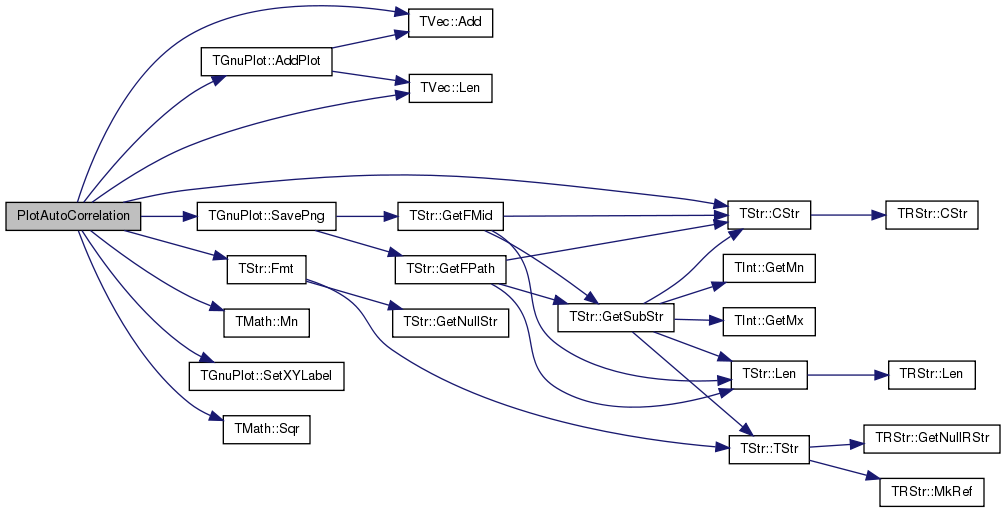|
SNAP Library 2.2, Developer Reference
2014-03-11 19:15:55
SNAP, a general purpose, high performance system for analysis and manipulation of large networks
|
|
SNAP Library 2.2, Developer Reference
2014-03-11 19:15:55
SNAP, a general purpose, high performance system for analysis and manipulation of large networks
|

Go to the source code of this file.
Functions | |
| void | GetMinMax (const TFltPrV &XYValV, double &Min, double &Max, const bool &ResetMinMax) |
| void | PlotGrad (const TFltPrV &EstLLV, const TFltPrV &TrueLLV, const TVec< TFltPrV > &GradVV, const TFltPrV &AcceptV, const TStr &OutFNm, const TStr &Desc) |
| void | PlotAutoCorrelation (const TFltV &ValV, const int &MaxK, const TStr &OutFNm, const TStr &Desc) |
| void | McMcGetAvgAvg (const TFltV &AvgJV, double &AvgAvg) |
| void | McMcGetAvgJ (const TVec< TFltV > &ChainLLV, TFltV &AvgJV) |
| void | PlotTrueAndEst (const TStr &OutFNm, const TStr &Desc, const TStr &YLabel, const TFltPrV &EstV, const TFltPrV &TrueV) |
Definition at line 1732 of file kronecker.cpp.
References TVec< TVal, TSizeTy >::Len(), TMath::Mn(), TFlt::Mn, TMath::Mx(), and TFlt::Mx.
Referenced by PlotGrad().
{
if (ResetMinMax) { Min = TFlt::Mx; Max = TFlt::Mn; }
for (int i = 0; i < XYValV.Len(); i++) {
Min = TMath::Mn(Min, XYValV[i].Val2.Val);
Max = TMath::Mx(Max, XYValV[i].Val2.Val);
}
}


| void McMcGetAvgAvg | ( | const TFltV & | AvgJV, |
| double & | AvgAvg | ||
| ) |
Definition at line 1876 of file kronecker.cpp.
References TVec< TVal, TSizeTy >::Len().
Referenced by TKroneckerLL::CalcChainR2().
{
AvgAvg = 0.0;
for (int j = 0; j < AvgJV.Len(); j++) {
AvgAvg += AvgJV[j]; }
AvgAvg /= AvgJV.Len();
}


| void McMcGetAvgJ | ( | const TVec< TFltV > & | ChainLLV, |
| TFltV & | AvgJV | ||
| ) |
Definition at line 1883 of file kronecker.cpp.
References TVec< TVal, TSizeTy >::Add(), and TVec< TVal, TSizeTy >::Len().
Referenced by TKroneckerLL::CalcChainR2().
{
for (int j = 0; j < ChainLLV.Len(); j++) {
const TFltV& ChainV = ChainLLV[j];
double Avg = 0;
for (int i = 0; i < ChainV.Len(); i++) {
Avg += ChainV[i];
}
AvgJV.Add(Avg/ChainV.Len());
}
}


| void PlotAutoCorrelation | ( | const TFltV & | ValV, |
| const int & | MaxK, | ||
| const TStr & | OutFNm, | ||
| const TStr & | Desc | ||
| ) |
Definition at line 1773 of file kronecker.cpp.
References TVec< TVal, TSizeTy >::Add(), TGnuPlot::AddPlot(), TStr::CStr(), TStr::Fmt(), gpwLines, TVec< TVal, TSizeTy >::Len(), TMath::Mn(), TGnuPlot::SavePng(), TGnuPlot::SetXYLabel(), and TMath::Sqr().
Referenced by TKroneckerLL::TestSamplePerm().
{
double Avg=0.0, Var=0.0;
for (int i = 0; i < ValV.Len(); i++) { Avg += ValV[i]; }
Avg /= (double) ValV.Len();
for (int i = 0; i < ValV.Len(); i++) { Var += TMath::Sqr(ValV[i]-Avg); }
TFltPrV ACorrV;
for (int k = 0; k < TMath::Mn(ValV.Len(), MaxK); k++) {
double corr = 0.0;
for (int i = 0; i < ValV.Len() - k; i++) {
corr += (ValV[i]-Avg)*(ValV[i+k]-Avg);
}
ACorrV.Add(TFltPr(k, corr/Var));
}
// plot grads
TGnuPlot GP("sAutoCorr-"+OutFNm, TStr::Fmt("AutoCorrelation (%d samples). %s", ValV.Len(), Desc.CStr()), true);
GP.AddPlot(ACorrV, gpwLines, "", "linewidth 1");
GP.SetXYLabel("Lag, k", "Autocorrelation, r_k");
GP.SavePng();
}


| void PlotGrad | ( | const TFltPrV & | EstLLV, |
| const TFltPrV & | TrueLLV, | ||
| const TVec< TFltPrV > & | GradVV, | ||
| const TFltPrV & | AcceptV, | ||
| const TStr & | OutFNm, | ||
| const TStr & | Desc | ||
| ) |
Definition at line 1740 of file kronecker.cpp.
References TGnuPlot::AddPlot(), TStr::CStr(), TVec< TVal, TSizeTy >::Empty(), TStr::Fmt(), GetMinMax(), gpwLines, TVec< TVal, TSizeTy >::Len(), TGnuPlot::SavePng(), TGnuPlot::SetXYLabel(), and TGnuPlot::SetYRange().
Referenced by TKroneckerLL::TestSamplePerm().
{
double Min, Max, Min1, Max1;
// plot log-likelihood
{ TGnuPlot GP("sLL-"+OutFNm, TStr::Fmt("Log-likelihood (avg 1k samples). %s", Desc.CStr()), true);
GP.AddPlot(EstLLV, gpwLines, "Esimated LL", "linewidth 1");
if (! TrueLLV.Empty()) { GP.AddPlot(TrueLLV, gpwLines, "TRUE LL", "linewidth 1"); }
//GetMinMax(EstLLV, Min, Max, true); GetMinMax(TrueLLV, Min, Max, false);
//GP.SetYRange((int)floor(Min-1), (int)ceil(Max+1));
GP.SetXYLabel("Sample Index (time)", "Log-likelihood");
GP.SavePng(); }
// plot accept
{ TGnuPlot GP("sAcc-"+OutFNm, TStr::Fmt("Pct. accepted rnd moves (over 1k samples). %s", Desc.CStr()), true);
GP.AddPlot(AcceptV, gpwLines, "Pct accepted swaps", "linewidth 1");
GP.SetXYLabel("Sample Index (time)", "Pct accept permutation swaps");
GP.SavePng(); }
// plot grads
TGnuPlot GPAll("sGradAll-"+OutFNm, TStr::Fmt("Gradient (avg 1k samples). %s", Desc.CStr()), true);
GetMinMax(GradVV[0], Min1, Max1, true);
for (int g = 0; g < GradVV.Len(); g++) {
GPAll.AddPlot(GradVV[g], gpwLines, TStr::Fmt("param %d", g+1), "linewidth 1");
GetMinMax(GradVV[g], Min1, Max1, false);
TGnuPlot GP(TStr::Fmt("sGrad%02d-", g+1)+OutFNm, TStr::Fmt("Gradient (avg 1k samples). %s", Desc.CStr()), true);
GP.AddPlot(GradVV[g], gpwLines, TStr::Fmt("param id %d", g+1), "linewidth 1");
GetMinMax(GradVV[g], Min, Max, true);
GP.SetYRange((int)floor(Min-1), (int)ceil(Max+1));
GP.SetXYLabel("Sample Index (time)", "Gradient");
GP.SavePng();
}
GPAll.SetYRange((int)floor(Min1-1), (int)ceil(Max1+1));
GPAll.SetXYLabel("Sample Index (time)", "Gradient");
GPAll.SavePng();
}


| void PlotTrueAndEst | ( | const TStr & | OutFNm, |
| const TStr & | Desc, | ||
| const TStr & | YLabel, | ||
| const TFltPrV & | EstV, | ||
| const TFltPrV & | TrueV | ||
| ) |
Definition at line 2009 of file kronecker.cpp.
References TGnuPlot::AddPlot(), TStr::CStr(), TVec< TVal, TSizeTy >::Empty(), gpwLines, and gpwLinesPoints.
Referenced by TKroneckerLL::GradDescentConvergence().
{
TGnuPlot GP(OutFNm, Desc.CStr(), true);
GP.AddPlot(EstV, gpwLinesPoints, YLabel, "linewidth 1 pointtype 6 pointsize 1");
if (! TrueV.Empty()) { GP.AddPlot(TrueV, gpwLines, "TRUE"); }
GP.SetXYLabel("Gradient descent iterations", YLabel);
GP.SavePng();
}

